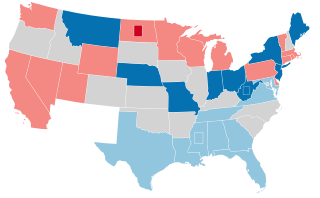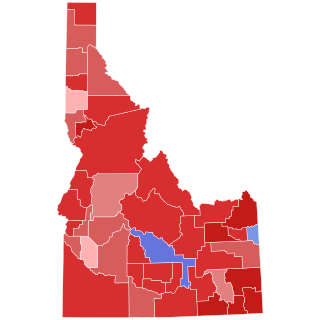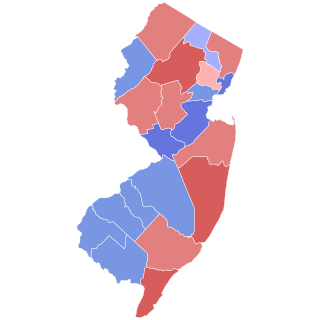
Michael Dean Crapo is an American lawyer and politician serving as the senior United States senator from Idaho, a seat he has held since 1999. A member of the Republican Party, Crapo served as the U.S. representative for Idaho's 2nd congressional district from 1993 to 1999. He is the dean of Idaho's congressional delegation, having served since 1993.

The 1964 United States Senate elections were held on November 3. The 33 seats of Class 1 were contested in regular elections. Special elections were also held to fill vacancies. They coincided with the election of President Lyndon B. Johnson by an overwhelming majority, to a full term. His Democratic Party picked up a net two seats from the Republicans. As of 2023, this was the last time either party has had a two-thirds majority in the Senate, which allowed the Senate Democrats to override a veto, propose constitutional amendments, or convict and expel certain officials without any votes from Senate Republicans. However, internal divisions would have prevented the Democrats from having done so. The Senate election cycle coincided with Democratic gains in the House in the same year.

Alpheus Starkey Williams was a lawyer, judge, journalist, U.S. Congressman, and a Union general in the American Civil War.

The 45th United States Congress was a meeting of the legislative branch of the United States federal government, consisting of the United States Senate and the United States House of Representatives. It met in Washington, D.C. from March 4, 1877, to March 4, 1879, during the first two years of Rutherford Hayes's presidency. The apportionment of seats in the House of Representatives was based on the 1870 United States census. The Senate had a Republican majority, and the House had a Democratic majority.

The 1910–11 United States Senate election were held on various dates in various states. As these U.S. Senate elections were prior to the ratification of the Seventeenth Amendment in 1913, senators were primarily chosen by state legislatures. Senators were elected over a wide range of time throughout 1910 and 1911, and a seat may have been filled months late or remained vacant due to legislative deadlock. However, some states had already begun direct elections during this time. Oregon pioneered direct election and experimented with different measures over several years until it succeeded in 1907. Soon after, Nebraska followed suit and laid the foundation for other states to adopt measures reflecting the people's will. By 1912, as many as 29 states elected senators either as nominees of their party's primary or in conjunction with a general election.

Henry Howland Crapo was a businessman and politician who was the 14th governor of Michigan from 1865 to 1869, during the end of the American Civil War and the beginning of Reconstruction.
The Massachusetts Republican Party (MassGOP) is the Massachusetts branch of the U.S. Republican Party.

James Sidney Robinson was a U.S. Representative from Ohio and a general in the Union Army during the American Civil War. He served two terms in Congress from 1881 to 1885.

The 2004 United States Senate election in Idaho took place on November 2, 2004, alongside other elections to the United States Senate in other states as well as elections to the United States House of Representatives and various state and local elections. Incumbent Republican Senator Mike Crapo ran for and won a second term in office in a landslide, as he was the only voting option besides a write-in campaign. Democrat Scott McClure conducted a write-in campaign but only received 4,136 votes, or 0.82% of those cast.

The United States Senate election of 1930 in Massachusetts was held on November 4, 1930. Incumbent Republican Senator Frederick H. Gillett did not run for re-election. In the open race to succeed him, Democratic Mayor of Fitchburg Marcus A. Coolidge defeated former U.S. Senator William M. Butler.

The 1946 Pennsylvania gubernatorial election was held on November 5, 1946. Republican Party nominee James H. Duff defeated Democratic Party nominee John S. Rice to become Governor of Pennsylvania. As of 2025, this was the last time Philadelphia County voted for the Republican candidate.

The 1822–23 United States Senate elections were held on various dates in various states. As these U.S. Senate elections were before the ratification of the Seventeenth Amendment in 1913, senators were chosen by state legislatures. Senators were elected over a wide range of time throughout 1822 and 1823, and a seat may have been filled months late or remained vacant due to legislative deadlock. In these elections, terms were up for the senators in Class 2.

The 1976 United States Senate election in California took place on November 2, 1976. Incumbent Democratic U.S. Senator John V. Tunney ran for re-election to a second term, but was defeated by Republican S. I. Hayakawa. As of 2024, this is the last time an incumbent Democratic Senator from California lost re-election.
The 1893 United States Senate election in Massachusetts was held during January 1893. Republican incumbent Henry L. Dawes chose not to seek a fourth term in office, and was replaced by Republican Congressman Henry Cabot Lodge.

The 2016 United States Senate election in Idaho was held November 8, 2016, to elect a member of the United States Senate to represent the State of Idaho, concurrently with the 2016 U.S. presidential election, as well as other elections to the United States Senate in other states and elections to the United States House of Representatives and various state and local elections. The primaries were held May 17.

The 2022 United States Senate election in Idaho was held on November 8, 2022, to elect a member of the United States Senate to represent the state of Idaho. Incumbent Republican Senator Mike Crapo was first elected in 1998 and ran for re-election to a fifth term in office. Primary elections were held on May 17, 2022. Crapo easily won renomination, while former Idaho House of Representatives candidate David Roth won the Democratic primary with 57.8% of the vote. Crapo ultimately won the election, but this was the lowest share of the vote he had ever received for this seat, partially because of an independent candidate, Scott Cleveland, taking away some of his votes.

The 1958 United States Senate election in New Jersey was held on November 4, 1958.

The 1864 Michigan gubernatorial election was held on November 8, 1864. Republican nominee Henry H. Crapo defeated Democratic nominee William M. Fenton with 55.15% of the vote.

The 1960 Arkansas gubernatorial election was held on November 8, 1960.

The 1877 Maine gubernatorial election was held on September 10, 1877. Incumbent Republican governor Seldon Connor defeated Democratic nominee and former governor Joseph H. Williams and Greenback nominee Henry C. Munson.





















